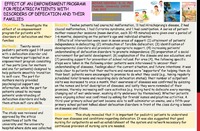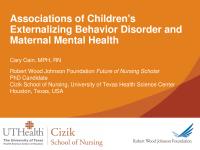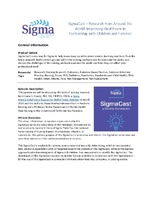| dc.contributor.author | Nishida, Miyuki | en |
| dc.date.accessioned | 2016-03-17T13:02:14Z | |
| dc.date.available | 2016-03-17T13:02:14Z | |
| dc.date.issued | 2016-03-17 | |
| dc.identifier | INRC15PST215 | en |
| dc.identifier.uri | http://hdl.handle.net/10755/602038 | en |
| dc.description | <p>Research Congress 2015 Theme: Question Locally, Engage Regionally, Apply Globally. Held at the Puerto Rico Convention Center.</p> | en |
| dc.description.abstract | <p>Session presented on Saturday, July 25, 2015:</p>
<p><strong>Objective:</strong> To investigate the effect of an empowerment program for children with disorders of defecation and their families.</p>
<p><strong>Methods:</strong> Twenty-seven children aged 1-14 years with a defecation disorder and their mothers participated in an empowerment program consisting of two parts (one for mothers and one for children) designed to help children smoothly transition to self-care. The part for mothers mainly provided emotional support and information, while the part for patients aimed to increase children's understanding of defecation disorders and help them attain self-care skills.</p>
<p><strong>Results:</strong> Twelve patients had anorectal malformation, 11 had Hirschsprung's disease, 2 had cloacal malformation, 1 had Currarino syndrome, and 1 had constipation. A series of child-mother-researcher sessions (mean duration, each 30-45 minutes) were given over a period of 1-6 months, depending on the child's age and individual situation. Effects of intervention were seen in seven areas of support: (1) attainment of childrens' independence in defecating; (2) introduction of forcible defecation; (3) identification of developmental disorders and provision of appropriate support; (4) increasing children's understanding of defecation disorders to promote independence; (5) preparation of a social environment for children's development; (6) explanation of the disease and sex education; and (7) providing support for prevention of school refusal. For area (4), the following specific steps were taken in the following order: children were interviewed to uncover their understanding of diseases, feelings about the current situation, and future intentions; it was made clear to children that their mothers and nurses were 'supporters' for helping them do their best; children were encouraged to promise to do what they could (e.g., taking regularly scheduled toilet breaks and recording daily defecation status); their number of outpatient visits was increased to once a month; their awareness of diseases was confirmed by quizzing on the names and brief description of diseases; and lastly they were reminded of their promises, thereby increasing self-care activities (e.g. trying hard to defecate every morning, changing out of wet underwear, washing dirty underwear by themselves). Whether children were enjoying school was confirmed by asking for friends' names and playtime activities. A third-year primary school patient became able to self-administer an enema, and a fifth-year primary school child talked about defecation disorders in front of the class during a lesson on diseases and illness.</p>
<p><strong>Discussion:</strong> This study revealed that it is important for children to understand their own diseases and conditions regarding defecation. It was also suggested that good nursing for outpatients as well as establishment of the system and network necessary for continuous provision of nursing care are needed.</p> | en |
| dc.format | Text-based Document | en |
| dc.language.iso | en | en |
| dc.subject | Children with Disorders of Defecation | en |
| dc.subject | Hirschsprung's Disease | en |
| dc.subject | Transition | en |
| dc.subject.mesh | Patient Education | en |
| dc.title | Effect of an empowerment program for children with disorders of defecation and their families | en |
| dc.type | Poster | en |
| dc.rights.holder | <p>
All rights reserved by the author(s) and/or publisher(s) listed in this item record unless relinquished in whole or part by a rights notation or a Creative Commons License present in this item record.
</p><p>
All permission requests should be directed accordingly and not to the Sigma Repository.
</p><p>
All submitting authors or publishers have affirmed that when using material in their work where they do not own copyright, they have obtained permission of the copyright holder prior to submission and the rights holder has been acknowledged as necessary.
</p> | en |
| dc.description.note | <p>Items submitted to a conference/event were evaluated/peer-reviewed at the time of abstract submission to the event. No other peer-review was provided prior to submission to the Henderson Repository.</p> | |
| dc.type.category | Full-text | en |
| dc.evidence.level | N/A | en |
| dc.research.approach | N/A | en |
| dc.subject.cinahl | Hirschsprung Disease | en |
| dc.subject.cinahl | Defecation | en |
| dc.subject.cinahl | Empowerment | en |
| dc.subject.cinahl | Health Transition | en |
| dc.subject.cinahl | Child | en |
| dc.contributor.department | Tau Nu | en |
| dc.author.details | Miyuki Nishida, PhD, RN | en |
| dc.conference.name | 26th international Nursing Research Congress | en |
| dc.conference.host | Sigma Theta Tau International | en |
| dc.conference.location | San Juan, Puerto Rico | en |
| dc.date.conferenceyear | 2015 | |
| dc.description.reviewtype | Abstract Review Only: Reviewed by Event Host | en |
| dc.description.acquisition | Proxy-submission | en |





